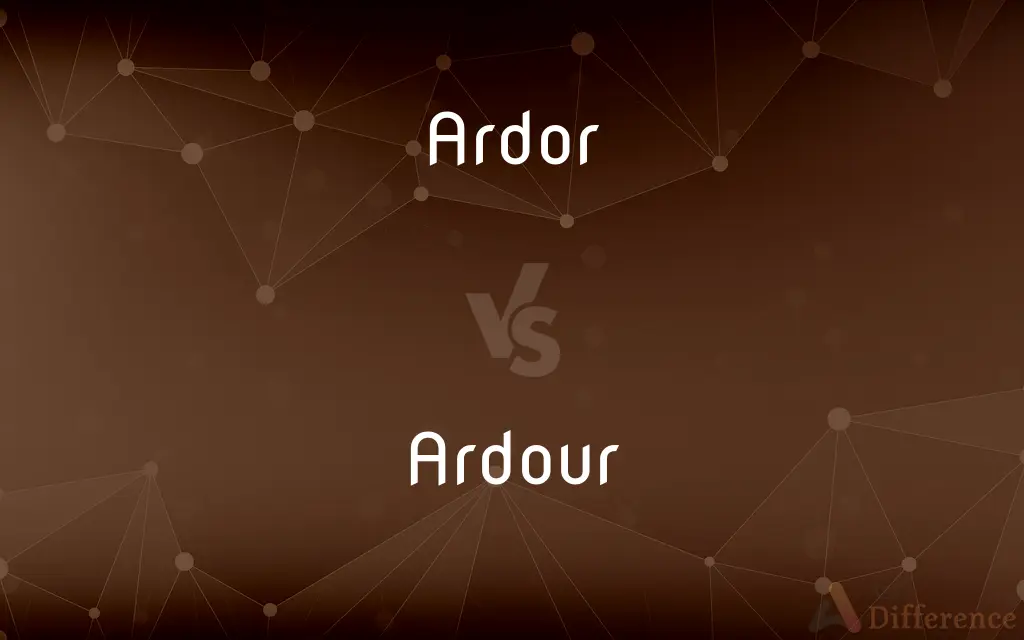Ardor vs. Ardour — What's the Difference?
By Tayyaba Rehman — Updated on September 30, 2023
"Ardor" and "Ardour" mean the same: intense emotion or passion. "Ardor" is American English spelling, while "Ardour" is British English spelling.

Difference Between Ardor and Ardour
Table of Contents
ADVERTISEMENT
Key Differences
"Ardor" and "Ardour" represent the same concept but are spelled differently due to linguistic variations between American and British English. Both words refer to intense emotion, passion, or enthusiasm, usually applied in the context of love, zeal, or devotion. "Ardor" is the preferred spelling in American English, while "Ardour" is used in British English, reflecting the difference in spelling conventions between the two language systems.
The use of "Ardor" and "Ardour" extends to various contexts to describe fervor or zeal in actions, thoughts, or expressions. Regardless of the spelling, the essence of the word remains unchanged, representing a high degree of intensity or warmth in feelings. The spelling variation does not impact the word’s meaning, but rather indicates the regional language preference, with "Ardor" being more common in American publications and "Ardour" in British ones.
These words are utilized to express a range of emotions, such as eagerness, zeal, fervor, and passion. Whether spelled as "Ardor" or "Ardour," the word conveys a similar sense of burning desire or enthusiastic intensity. This can be applied to describe not only emotional states but also the vigor or intensity with which tasks or activities are undertaken. The distinctions in spelling are thus superficial, affecting only the appearance of the word and not its application or implication.
In literature and everyday language, "Ardor" or "Ardour" is often used to depict intense and passionate feelings. It’s a versatile word that enriches language by providing a means to express fervent emotions or passionate states of being. The selection between "Ardor" and "Ardour" is generally based on the writer’s or speaker’s preference for American or British English spelling conventions, ensuring the correct form is used in the corresponding linguistic context.
To sum up, "Ardor" and "Ardour" are interchangeable, differing only in regional spelling preferences, with the former being American and the latter being British. They are synonymous in meaning and application, allowing for expressive communication of passion, zeal, or intense emotion in various contexts, thus adding depth and nuance to language and expression.
ADVERTISEMENT
Comparison Chart
Definition
Represents intense emotion or passion.
Represents intense emotion or passion.
Spelling
Preferred spelling in American English.
Preferred spelling in British English.
Usage
Used in American publications and communications.
Used in British publications and communications.
Context
Applied to describe fervor or zeal in actions or thoughts.
Applied to describe fervor or zeal in actions or thoughts.
Meaning
The meaning remains the same as "Ardour": intense and passionate emotion.
The meaning remains the same as "Ardor": intense and passionate emotion.
Compare with Definitions
Ardor
Burning desire or love.
Their ardor for each other was evident to everyone around them.
Ardour
Enthusiastic zeal or fervour.
The scientist worked with ardour on the groundbreaking project.
Ardor
A strong feeling of energy or eagerness.
The team played with ardor, demonstrating their desire to win.
Ardour
A strong sense of eagerness or energy.
The volunteers showed immense ardour in helping the community.
Ardor
Intense and passionate emotion.
His ardor for reforming the educational system was well-known.
Ardour
Burning desire, especially in the context of love.
Their eyes met, and an unspoken ardour passed between them.
Ardor
Zealous enthusiasm or fervor.
She pursued her studies with great ardor.
Ardour
The warmth or heat of sentiment or devotion.
The speaker’s ardour on environmental issues inspired the audience.
Ardor
Warmth or heat of emotion or expression.
He spoke with ardor about his vision for the company's future.
Ardour
Intense and passionate feeling.
His ardour for music was apparent in his lively and expressive performances.
Ardor
Intensity of emotion, especially strong desire, enthusiasm, or devotion.
Ardour
Great enthusiasm or passion
The rebuff did little to dampen his ardour
He kissed her with an ardour that left her breathless
Ardor
Great warmth of feeling; fervor; passion.
Ardour
Variant of ardor.
Ardor
Spirit; enthusiasm; passion.
Ardour
Alternative spelling of ardor
Ardor
Intense heat.
Ardour
A feeling of strong eagerness (usually in favor of a person or cause);
They were imbued with a revolutionary ardor
He felt a kind of religious zeal
Ardor
Heat, in a literal sense; as, the ardor of the sun's rays.
Ardour
Intense feeling of love
Ardor
Warmth or heat of passion or affection; eagerness; zeal; as, he pursues study with ardor; the fought with ardor; martial ardor.
Ardour
Feelings of great warmth and intensity;
He spoke with great ardor
Ardor
Bright and effulgent spirits; seraphim.
Ardor
A feeling of strong eagerness (usually in favor of a person or cause);
They were imbued with a revolutionary ardor
He felt a kind of religious zeal
Ardor
Intense feeling of love
Ardor
Feelings of great warmth and intensity;
He spoke with great ardor
Common Curiosities
Can "Ardor" express a range of emotions like eagerness and zeal?
Yes, "Ardor" can express a range of intense emotions, including eagerness and zeal.
Can "Ardour" depict passionate feelings in literature?
Yes, "Ardour" is often used in literature to depict intense and passionate feelings.
Do "Ardor" and "Ardour" have the same meaning?
Yes, "Ardor" and "Ardour" are synonymous, both meaning intense emotion or passion.
Is "Ardor" the American English spelling?
Yes, "Ardor" is the preferred spelling in American English.
Is "Ardor" used in the context of love?
Yes, "Ardor" can be used to describe burning desire or love.
Does "Ardour" convey a sense of burning desire?
Yes, "Ardour" conveys a sense of intense, burning desire or passion.
Can "Ardor" refer to the fervor or zeal in actions or thoughts?
Yes, "Ardor" can be applied to describe the fervor or zeal in actions or thoughts.
Is "Ardour" the British English spelling?
Yes, "Ardour" is the preferred spelling in British English.
Is the selection between "Ardor" and "Ardour" based on regional language preference?
Yes, the choice between "Ardor" and "Ardour" depends on whether American or British English spelling conventions are being used.
Share Your Discovery

Previous Comparison
Since vs. Therefore
Next Comparison
Occlusion vs. ObstructionAuthor Spotlight
Written by
Tayyaba RehmanTayyaba Rehman is a distinguished writer, currently serving as a primary contributor to askdifference.com. As a researcher in semantics and etymology, Tayyaba's passion for the complexity of languages and their distinctions has found a perfect home on the platform. Tayyaba delves into the intricacies of language, distinguishing between commonly confused words and phrases, thereby providing clarity for readers worldwide.
















































